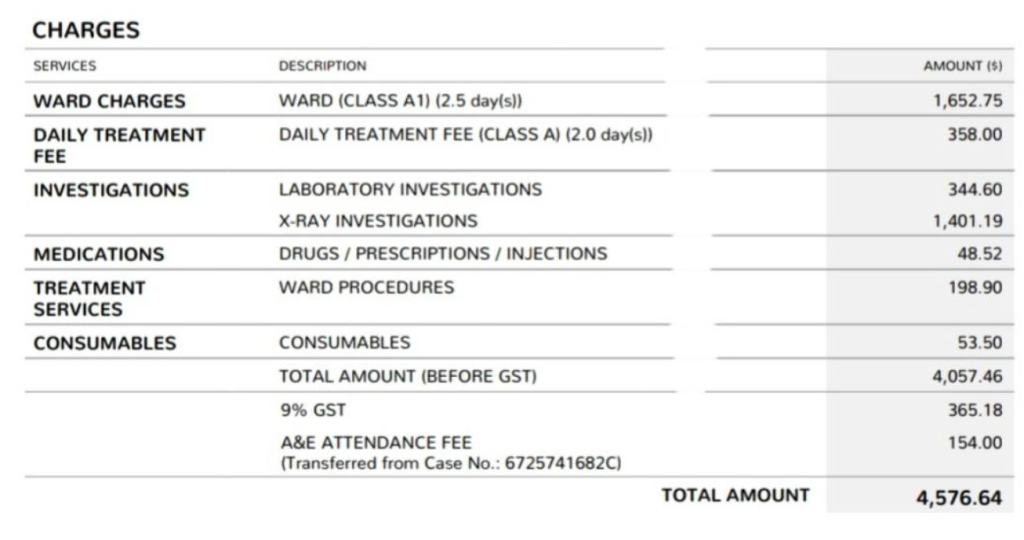Introduction
Experiencing a medical emergency can be a distressing ordeal, and navigating the healthcare system during such times can add to the frustration. This was the case for a patient at Singapore General Hospital (SGH), who faced an unexpected billing issue after being charged a premium A Ward rate for a stay that included significant time spent in a holding area.
The patient was referred to the Accident and Emergency (A&E) department on June 9 due to severe lower abdominal pain and ultimately spent less than 24 hours in the A Ward. However, the billing reflected a charge for 2.5 days, raising questions about the hospital’s policies and practices regarding patient billing, particularly in relation to the duration of stay in different areas of the hospital.
Here are the details:

“At Singapore General Hospital I was charged a premium A Ward rate for 2.5 days, when I only spent less than 24 hours in the ward.
I was referred to A&E at the Singapore General Hospital on 9 June with severe lower abdominal pain.I reached there at around 130pm. After seeing the doctor and doing some tests, the doctor wanted me to stay for further tests. I was put in the temp bed at the waiting/holding ward at around 5pm+.
At that time a staff came and asked what class of ward I would like to stay in. I wanted comfort so, I chose the A ward. The staff said we will take you there once the room is ready. I waited until the next day 10 June, 8pm then they said, room is available, and finally put me in my selected ward. I was at the holding area for more than 30 agonizing hours. The doctor discharged me the next day.
When I received the bill, SGH actually billed me for 2.5 days at premium A ward rate. When I wrote in to enquire, they said that it is their policy to charge the patient the chosen ward rate, even at the holding area.
I don’t mind paying premium, but how can I pay for something which I did not receive? I am perfectly fine if they bill me 1.5 days which is the actual duration of my stay in my chosen ward. They shouldn’t charge me the premium ward rate the night spent at A&E holding area.“
Analysis
Upon arrival at SGH, the patient was promptly assessed and advised to remain for further tests. After several hours in the A&E department, the patient was placed in a temporary holding area, where they remained for over 30 hours before being transferred to the A Ward. During this time, the patient was informed of the option to choose a premium ward for added comfort, which they accepted. However, the prolonged wait in the holding area, which is not a designated ward, raises concerns about the appropriateness of billing practices.
The hospital’s policy to charge patients based on their chosen ward rate, even while in a holding area, appears to lack transparency and fairness. The patient argues that they should only be billed for the actual duration spent in the A Ward, which was less than 24 hours, rather than being charged for the entire time spent in the holding area. This situation highlights a potential disconnect between hospital policies and patient expectations, particularly regarding the definition of a “stay” in a premium ward.
Moreover, the billing practices in question may contribute to a broader issue of trust in the healthcare system. Patients expect to receive value for the services they pay for, and being charged for time spent in a holding area—where no premium services are provided—can lead to feelings of dissatisfaction and frustration. The patient’s willingness to pay for premium services is evident, but the expectation is that such charges should reflect the actual services rendered.
Conclusion
The billing experience at Singapore General Hospital serves as a critical reminder of the importance of clear communication and fair practices within the healthcare system. While the hospital’s policy may be designed to streamline billing processes, it ultimately fails to account for the nuances of patient experiences, particularly in situations involving extended waiting times in holding areas. The patient’s request for a more equitable billing approach—charging only for the actual duration spent in the A Ward—highlights a need for hospitals to reassess their policies to ensure they align with patient expectations and experiences. Moving forward, it is essential for healthcare providers to foster transparency and trust, ensuring that patients feel valued and fairly treated throughout their medical journeys.
Source: Cleo
